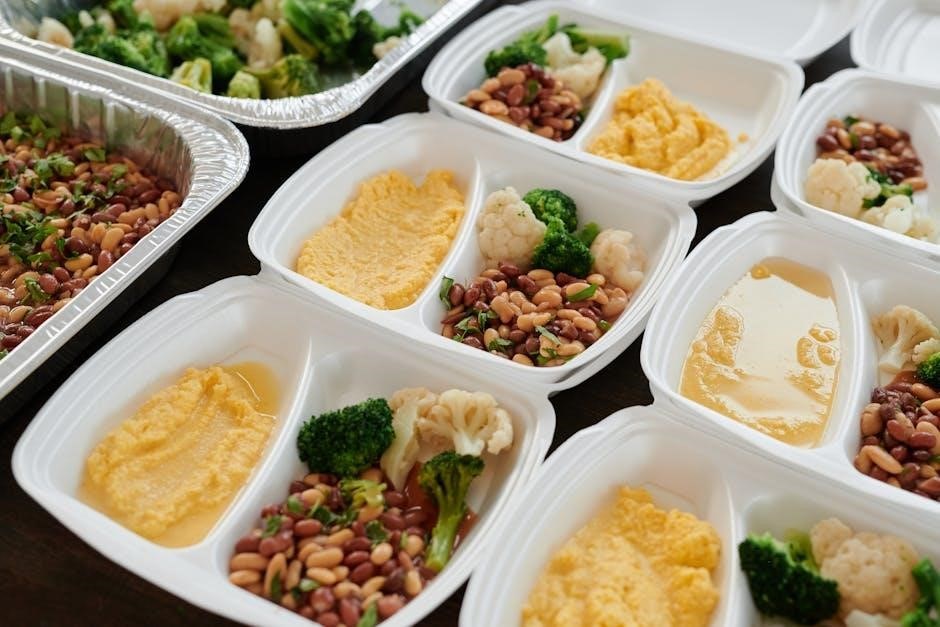
This structured 8-week diet plan is designed to enhance running performance by focusing on balanced nutrition, hydration, and optimal fueling strategies for endurance and recovery.
Overview of the Plan
This 8-week diet plan is tailored to help runners optimize their nutrition, enhance performance, and support recovery. It focuses on balancing macronutrients, staying hydrated, and timing meals appropriately around training. The plan emphasizes whole, nutrient-dense foods, including lean proteins, complex carbohydrates, and healthy fats, while minimizing processed items. It also incorporates practical tips for fueling workouts, replenishing electrolytes, and maintaining consistent energy levels. By following this structured approach, runners can condition their bodies to adapt to training demands and improve overall endurance. The plan is flexible, allowing for personal preferences and dietary needs, ensuring sustainability and success.
Importance of Nutrition for Runners
Proper nutrition is essential for runners to optimize performance, enhance endurance, and support recovery. A well-balanced diet provides the necessary fuel for training, helping to maximize energy levels and reduce fatigue. Runners require adequate carbohydrates for glycogen stores, protein for muscle repair, and healthy fats for sustained energy. Hydration and electrolyte balance are also critical to prevent dehydration and maintain bodily functions. Without proper nutrition, runners may experience suboptimal performance, increased risk of injury, and slower recovery. A tailored diet ensures the body is prepared for the demands of training, enabling runners to achieve their goals effectively and safely. Consistency is key to long-term success.
Understanding the Runner’s Diet
A runner’s diet focuses on balancing macronutrients, staying hydrated, and timing meals to fuel workouts and aid recovery. It emphasizes whole foods for optimal energy and performance.
Key Macronutrients for Runners
Carbohydrates are essential for energy, with runners needing 2-3 grams per pound of body weight daily; Protein supports muscle repair and recovery, aiming for 0.5-0.7 grams per pound. Healthy fats, like those in nuts and avocados, aid in hormone production and absorption of vitamins. Balancing these macronutrients ensures sustained energy, supports training, and promotes overall health, making them the foundation of a runner’s diet plan.
Hydration and Electrolyte Balance
Proper hydration is vital for runners, as water makes up 60% of body weight and is crucial for temperature regulation and energy transport. Aim for 6-8 ounces of water every hour, adjusting for climate and intensity. Electrolytes, such as sodium and potassium, must be replenished to prevent imbalances that can cause cramps or fatigue. Sports drinks are ideal during long runs, while water and electrolyte-rich foods like bananas and nuts suffice for shorter sessions. Maintaining hydration and electrolyte balance ensures optimal performance and supports overall health throughout training. Consistency is key to avoiding dehydration and related issues.

Weekly Meal Plan Structure
This 8-week meal plan emphasizes balanced nutrition, focusing on whole foods like lean proteins, complex carbs, and healthy fats. Each day includes meals timed around runs for optimal energy and recovery.
Breakfast Options for Runners
Start your day with nutrient-dense breakfasts that fuel your runs. Opt for oatmeal with fruits and nuts, scrambled eggs with whole-grain toast, or Greek yogurt with berries and granola. Smoothies made with spinach, banana, and almond milk are also excellent. Avocado toast on whole-grain bread provides healthy fats for sustained energy. Timing your breakfast 1-3 hours before a run ensures proper digestion and energy availability. These meals balance complex carbs, proteins, and fats to support endurance and recovery, keeping you fueled throughout your training sessions.
Lunch and Dinner Ideas
Focus on balanced meals rich in complex carbs, lean proteins, and healthy fats. Grilled chicken or fish with quinoa, roasted vegetables, and a drizzle of olive oil makes a satisfying lunch. For dinner, opt for sweet potato mash with turkey or tofu, alongside steamed greens. Include legumes like lentils or chickpeas for plant-based protein. Avocado or nuts add healthy fats, while whole grains like brown rice or barley provide sustained energy. Aim for variety to ensure a broad intake of nutrients, supporting both performance and recovery throughout your training journey.
Snacking Strategies
Snacks play a crucial role in maintaining energy levels and aiding recovery between meals. Opt for nutrient-dense options like fresh fruits, nuts, or energy bars with a mix of carbs and protein. For post-run recovery, consider a banana with peanut butter or Greek yogurt with berries. Hydration is key, so pair snacks with water or electrolyte-rich drinks. Avoid heavy or high-sugar snacks that may cause digestive discomfort. Timing is important—aim to snack within 30 minutes after a run to replenish glycogen stores. Keep snacks simple, portable, and aligned with your training goals to fuel performance effectively throughout the day.
Training Integration
This phase focuses on aligning nutrition with training demands, ensuring proper fueling for workouts and recovery. It combines balanced meals with strategic hydration to optimize performance and endurance.
Fueling for Workouts
Fueling for workouts is crucial for optimizing performance and endurance. Runners should focus on consuming a balanced meal with complex carbohydrates and lean protein 2-3 hours before training. Hydration is key, with 16-20 ounces of water or a sports drink 1-2 hours pre-run. During long runs (over 60 minutes), aim to consume 30-60 grams of carbohydrates per hour from easy-to-digest sources like energy gels or bananas. Avoid heavy, high-fiber foods that may cause stomach discomfort. Timing and portion control ensure sustained energy levels and prevent fatigue, helping runners maintain consistency and intensity throughout their workouts.
Post-Run Recovery Nutrition
Post-run recovery nutrition is essential for replenishing energy stores and repairing muscles. Aim to refuel within 30-60 minutes after your workout with a mix of carbohydrates and protein (3:1 ratio). Include lean proteins like lean meats, eggs, or plant-based options to support muscle repair. Incorporate complex carbs from whole grains, fruits, and vegetables to restore glycogen levels. Stay hydrated by drinking water or a sports drink to replenish lost electrolytes; Avoid processed foods and opt for nutrient-dense meals to promote recovery and reduce muscle soreness. A well-timed, balanced meal aids in faster recovery, ensuring you’re ready for your next training session.

Nutrition Tips for Performance
Optimize your diet with whole foods, balancing carbs, proteins, and fats to fuel runs efficiently. Stay hydrated, timing meals around workouts to enhance energy and recovery.
Carbohydrate Loading
Carbohydrate loading is a key strategy for endurance runners, particularly before long-distance events. It involves increasing carbohydrate intake 2-3 days prior to race day to maximize glycogen stores, ensuring sustained energy levels during prolonged runs. Focus on complex carbs like whole grains, fruits, and vegetables, while reducing fiber intake to avoid digestive discomfort. Pair this with moderate protein consumption to maintain muscle function. Proper timing and balance are crucial to avoid overloading, which can lead to bloating or stomach issues. This method helps runners maintain peak performance and delays fatigue during high-intensity activities.
Protein for Muscle Repair
Protein is essential for muscle repair and recovery, especially for runners engaging in regular training. Aim for 1.2-1.6 grams of protein per kilogram of body weight daily, spread across meals to support muscle synthesis. Include lean sources like chicken, fish, eggs, and plant-based options such as legumes and tofu. Protein helps rebuild muscle fibers damaged during runs, reducing soreness and improving performance. Post-run recovery shakes or meals with protein can accelerate healing and prepare muscles for the next workout. Adequate protein intake ensures overall muscle health and resilience, making it a cornerstone of a runner’s diet for optimal training and recovery.

Hydration and Electrolytes
Proper hydration is vital for runners, with 6-8 oz of water every hour. Electrolytes like sodium and potassium must be replenished during long runs to prevent depletion.
Water Intake Guidelines
Adequate hydration is crucial for runners. Aim to drink 6-8 ounces of water every hour, adjusting for intensity and weather. Room temperature water is absorbed faster than cold or warm. During runs, fuel every 20 minutes with 45-60 grams of easily digestible carbohydrates. Post-run, replenish fluids within 30 minutes to aid recovery. Consistent hydration supports energy levels and prevents dehydration-related issues. Incorporate water-rich foods like fruits and vegetables into meals to enhance hydration. Monitor urine color; pale yellow indicates proper hydration. Make hydration a priority to optimize performance and overall health.
Electrolyte Replenishment
Electrolytes, such as sodium and potassium, are essential for maintaining fluid balance and nerve function during runs. Replenish electrolytes by consuming sports drinks or GU packets every 20-30 minutes during long runs. Post-run, incorporate electrolyte-rich foods like bananas, dates, and coconut water to restore levels. Aim to replenish within 30 minutes of finishing a run to support recovery. Avoid overhydration by listening to your body’s thirst cues. Balancing electrolytes helps prevent cramps and fatigue, ensuring optimal performance and recovery throughout your training; Consistency in replenishment is key to sustaining energy and endurance.

Mental and Physical Adaptation
Adapting mentally and physically through a structured diet enhances a runner’s endurance and accelerates recovery, ensuring peak performance throughout the training period.
Building Consistency
Consistency is key to adapting both mentally and physically. Establishing a regular eating schedule ensures your body is fueled for workouts and aids in recovery. Aim for balanced meals with the right mix of carbs, protein, and fats to maintain energy levels. Staying hydrated by drinking water regularly is equally important to prevent fatigue. Over time, your body will adapt to the demands of training, improving endurance and reducing the risk of injury. Tracking your habits helps maintain consistency, ensuring you stay on track with your diet and training goals throughout the 8-week plan.
Mindful Eating Practices
Mindful eating is crucial for runners to ensure they fuel their bodies effectively. Pay attention to hunger cues and eat gradually, savoring each bite. Avoid distractions like screens during meals to focus on your food. Choose nutrient-dense options, emphasizing whole foods over processed items. Practice portion control to maintain energy balance without overeating. Stay hydrated by drinking water throughout the day. Listening to your body’s needs helps prevent overtraining and supports recovery. By fostering a healthy relationship with food, you’ll enhance performance and overall well-being throughout the 8-week plan.
Consistently following the 8-week diet plan enhances performance and supports recovery. Monitor progress, adjust as needed, and maintain healthy habits to sustain long-term running success and overall well-being.
Evaluating Progress
Track your progress weekly by monitoring running performance, body composition, and energy levels. Keep a food and training log to assess consistency and adjustments. Measure improvements in endurance, speed, and recovery times. Use a running log to record mileage, pace, and how you feel post-workout. Regularly assess hydration and electrolyte balance to ensure optimal levels. Consider periodic body fat percentage measurements to align with weight goals. Adjust the diet plan as needed based on physical and mental responses, ensuring sustained progress toward your running and nutritional objectives throughout the 8-week period.
Continuing Healthy Habits
After completing the 8-week plan, focus on maintaining balanced nutrition and hydration to sustain performance. Incorporate whole foods, lean proteins, and complex carbs into your long-term diet. Consistency is key—plan meals weekly and stay hydrated by drinking water regularly. Gradually introduce new foods or habits to avoid setbacks; Celebrate small milestones, like increased energy or faster recovery times, to stay motivated. Aim to make healthy eating a lifelong commitment, adapting the principles of the plan to suit your evolving needs and goals as a runner.
Leave a Reply
You must be logged in to post a comment.